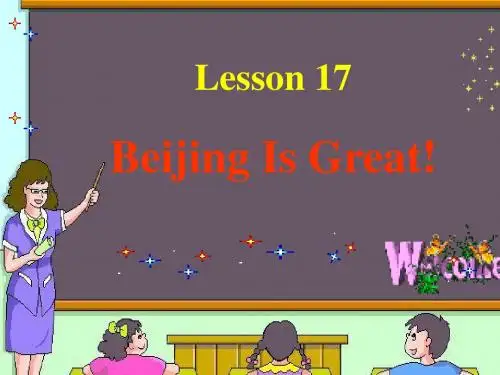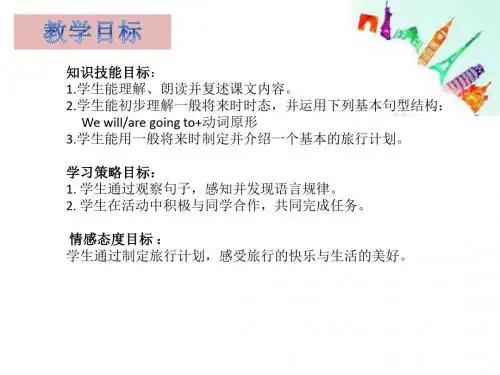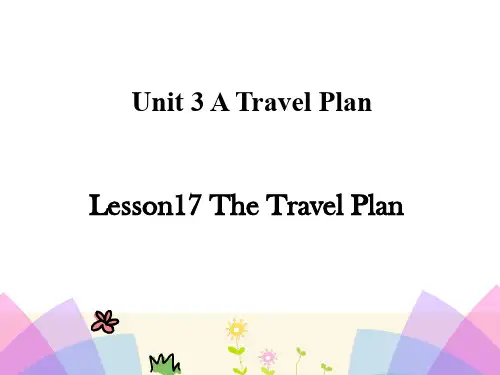(冀教版)五年级英语上册课件 Unit 3 Lesson 17beijing is great
- 格式:ppt
- 大小:512.00 KB
- 文档页数:11
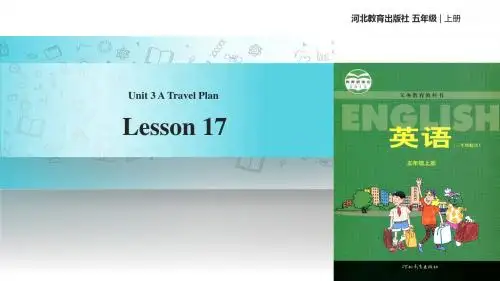
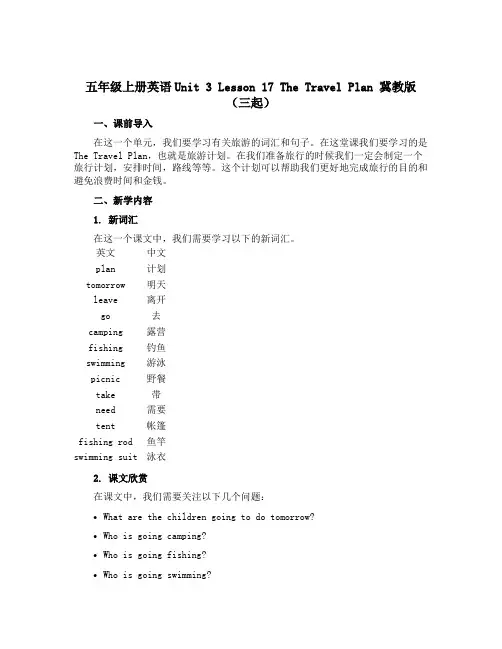
五年级上册英语Unit 3 Lesson 17 The Travel Plan 冀教版(三起)一、课前导入在这一个单元,我们要学习有关旅游的词汇和句子。
在这堂课我们要学习的是The Travel Plan,也就是旅游计划。
在我们准备旅行的时候我们一定会制定一个旅行计划,安排时间,路线等等。
这个计划可以帮助我们更好地完成旅行的目的和避免浪费时间和金钱。
二、新学内容1. 新词汇在这一个课文中,我们需要学习以下的新词汇。
英文中文plan计划tomorrow明天leave离开go去camping露营fishing钓鱼swimming游泳picnic野餐take带need需要tent帐篷fishing rod鱼竿swimming suit泳衣2. 课文欣赏在课文中,我们需要关注以下几个问题:•What are the children going to do tomorrow?•Who is going camping?•Who is going fishing?•Who is going swimming?•What do they need?以下是课文的内容:A: What are you going to do tomorrow, Tim?B: I’m going to leave for the lake with my family.A: What are you going to do there?B: We’re going to have a camping trip at the lake.A: That sounds interesting. What about you, Lucy? What are you going to do tomorrow?C: My family and I are going to go fishing at the lake.A: How about you, Mary?D: My family and I are going to go swimming at the park.A: What do you need for the trip?B: We need a tent and a fishing rod.C: We need a fishing rod, too.D: I need a swimming suit.3. 句子解析在课文中有一些需要特别记忆和理解的句子,以下是一些课文重要的句子:•What are you going to do tomorrow, Tim? : 明天你打算干什么, Tim?•We’re going to have a camping trip at the lake. : 我们要在湖边露营。
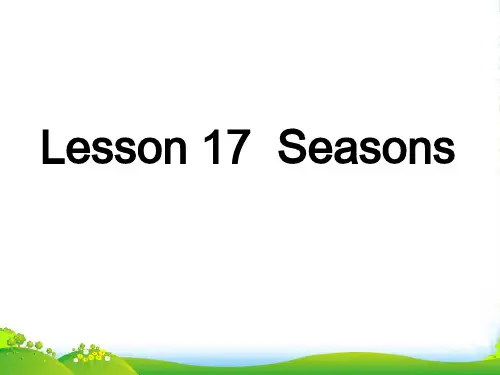
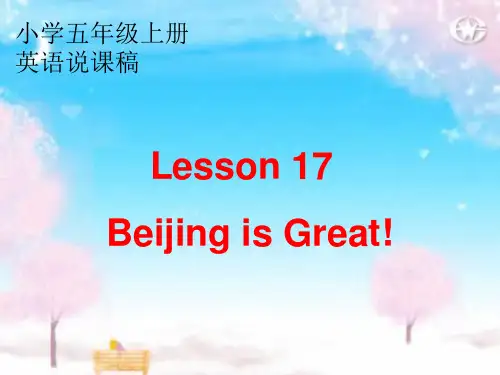
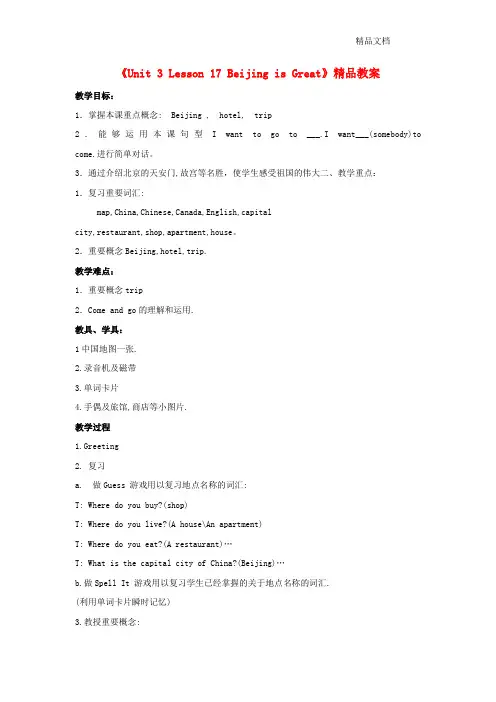
《Unit 3 Lesson 17 Beijing is Great》精品教案教学目标:1.掌握本课重点概念: Beijing , hotel, trip2.能够运用本课句型I want to go to ___.I want___(somebody)to come.进行简单对话。
3.通过介绍北京的天安门,故宫等名胜,使学生感受祖国的伟大二、教学重点:1.复习重要词汇:map,China,Chinese,Canada,English,capitalcity,restaurant,shop,apartment,house。
2.重要概念Beijing,hotel,trip.教学难点:1.重要概念trip2.Come and go的理解和运用.教具、学具:1中国地图一张.2.录音机及磁带3.单词卡片4.手偶及旅馆,商店等小图片.教学过程1.Greeting2. 复习a. 做Guess 游戏用以复习地点名称的词汇:T: Where do you buy?(shop)T: Where do you live?(A house\An apartment)T: Where do you eat?(A restaurant)…T: What is the capital city of China?(Beijing)…b.做Spell It 游戏用以复习学生已经掌握的关于地点名称的词汇.(利用单词卡片瞬时记忆)3.教授重要概念:出示中国地图,和学生一起找到北京,示范Beijing 一词.之后,在地图上贴上旅馆小图片.演示trip和hotel.手偶: I am going on a trip.教师: Where are you going ?手偶: I am going to ___.(目的地名称)教师: Do you live in ___?(目的地名称)手偶: No!I live in ___(所在城市名称).I live in a house\an apartment.教师: Do you have a house in ___(目的地)?手偶: No!I go to a hotel!Here I go !I am going on a trip to___!4. 与学生一起讨论有关北京的图片.他们最喜欢什么?谁曾到过北京?(the Palace Museum\Tian an men Square\hltel)5. play a game : Come here Go there6. 请同学们打开书,边听录音边找出表示地点的词汇.7.Read after the tape.8.练习:a. 制作题为A trip to Beijing 的张贴画.学生拿出课前准备好的图片,胶水,纸.4人1组.教师和学生一起开动脑筋,边制作,边鼓励学生尽可能多地运用英语.b. 造句练习要求学生以去哪及和谁一起去为内容造句.学生可以用任何地方为旅行的目的地.还要说出与他一起旅行的朋友的名字.I want to go to ___. I want ___and___to come ,too.c. 检查理解和应用请学生向全班陈述他们的张贴画,尽量使用完整的句子.9. 作业: a. 完成<活动手册>剩余部分.b. Talk about a trip.Make a travel plan.板书设计:I want to go to ______.1、Thank you very much for taking me with you on that splendid outing to London. It was the first time that I had seenthe Tower or any of the other famous sights. If I'd gone alone, I couldn't have seen nearly as much, because I wouldn't have known my way about.The weather was splendid on that day, which I thought was rare. I still remember some people told me that in Britain there was weather and no climate. During the same day, it might snow in the morning, rain at noon, shine in the afternoon and be windy before the night falls. So I think I was lucky。
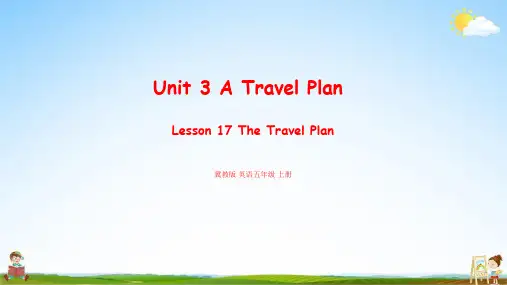
Unit 3 A Travel Plan Lesson 17 The Travel Plan冀教版英语五年级上册Learning goals✔学生能听懂、会说、认读并书写下列词汇:Sunday, Monday, Tuesday, Wednesday,Thursday, Friday, Saturday.✔学生能认读,理解并运用下列句型结构:I’m going to…/We are going to…I/We will…学生能写出或说出一个基本的旅行计划。
✔学生能了解字母组合或字母igh, y和i在单词中的发音及其规则。
✔Watch and singA plane is f_a_s_t_.A bus is _s_l_o_w_.Review and say 1. Where will Li Ming go?2. Who will he go there with?3. How will he go there?He will go to Beijing.He will go there with his mother, Danny and Jenny.He will go there by train.When will he go there? Do you know ?New wordsSunday周日New wordsMonday周一New wordsTuesday周二New wordsWednesday周三New wordsThursday周四New wordsFriday周五New wordsSaturday周六What’s missing?Listen and readSunday February 2MondayFebruary 3TuesdayFebruary 4WednesdayFebruary 5get readyfor the trip go to Beijing go to Tian’anmenSquarego to the PalaceMuseumThursday February 6FridayFebruary 7SaturdayFebruary 8go to theGreat Wall go shoppinggo homeWe are going to travel by train. We willgo to Beijing on February 3.Watch and answer1.When will Li Ming, Danny and Jenny goto Beijing?On Monday, February 3.2.When will he go to the Great Wall?On Thursday, February 6.3.When will he go home?On Saturday, February 8.Look and sayWe are going to/will get ready for the trip.…SundayFebruary 2MondayFebruary 3TuesdayFebruary 4WednesdayFebruary 5 get readyfor the trip go to Beijinggo to Tian’anmenSquarego to the PalaceMuseum ThursdayFebruary 6FridayFebruary 7SaturdayFebruary 8go to theGreat Wall go shoppinggo homeLet’s learnWe are going to travel by train.(打算旅行) to Tianjin.结构例句Point 1(打算玩) on the computer.I am g _o _i n _g _t _o _t _r _a _v _e l He i s _g _o _i _n g t o p _l a _y 用法某人+ be going to +动词(短语)原形 +(其他)be going to 意为“打算”,be 动词要随着主语的人称和数的变化而 变化。
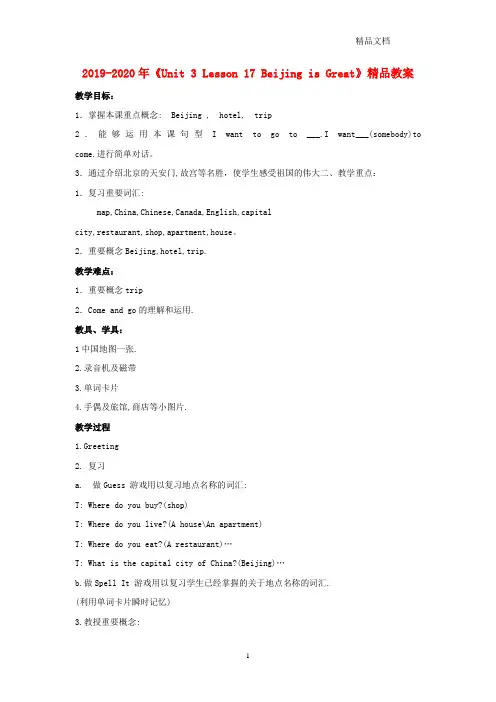
2019-2020年《Unit 3 Lesson 17 Beijing is Great》精品教案教学目标:1.掌握本课重点概念: Beijing , hotel, trip2.能够运用本课句型I want to go to ___.I want___(somebody)to come.进行简单对话。
3.通过介绍北京的天安门,故宫等名胜,使学生感受祖国的伟大二、教学重点:1.复习重要词汇:map,China,Chinese,Canada,English,capitalcity,restaurant,shop,apartment,house。
2.重要概念Beijing,hotel,trip.教学难点:1.重要概念trip2.Come and go的理解和运用.教具、学具:1中国地图一张.2.录音机及磁带3.单词卡片4.手偶及旅馆,商店等小图片.教学过程1.Greeting2. 复习a. 做Guess 游戏用以复习地点名称的词汇:T: Where do you buy?(shop)T: Where do you live?(A house\An apartment)T: Where do you eat?(A restaurant)…T: What is the capital city of China?(Beijing)…b.做Spell It 游戏用以复习学生已经掌握的关于地点名称的词汇.(利用单词卡片瞬时记忆)3.教授重要概念:出示中国地图,和学生一起找到北京,示范Beijing 一词.之后,在地图上贴上旅馆小图片.演示trip和hotel.手偶: I am going on a trip.教师: Where are you going ?手偶: I am going to ___.(目的地名称)教师: Do you live in ___?(目的地名称)手偶: No!I live in ___(所在城市名称).I live in a house\an apartment.教师: Do you have a house in ___(目的地)?手偶: No!I go to a hotel!Here I go !I am going on a trip to___!4. 与学生一起讨论有关北京的图片.他们最喜欢什么?谁曾到过北京?(the Palace Museum\Tian an men Square\hltel)5. play a game : Come here Go there6. 请同学们打开书,边听录音边找出表示地点的词汇.7.Read after the tape.8.练习:a. 制作题为A trip to Beijing 的张贴画.学生拿出课前准备好的图片,胶水,纸.4人1组.教师和学生一起开动脑筋,边制作,边鼓励学生尽可能多地运用英语.b. 造句练习要求学生以去哪及和谁一起去为内容造句.学生可以用任何地方为旅行的目的地.还要说出与他一起旅行的朋友的名字.I want to go to ___. I want ___and___to come ,too.c. 检查理解和应用请学生向全班陈述他们的张贴画,尽量使用完整的句子.9. 作业: a. 完成<活动手册>剩余部分.b. Talk about a trip.Make a travel plan.板书设计:I want to go to ______.1、Thank you very much for taking me with you on that splendid outing to London. It was the first time that I had seenthe Tower or any of the other famous sights. If I'd gone alone, I couldn't have seen nearly as much, because I wouldn't have known my way about.The weather was splendid on that day, which I thought was rare. I still remember some people told me that in Britain there was weather and no climate. During the same day, it might snow in the morning, rain at noon, shine in the afternoon and be windy before the night falls. So I think I was lucky。
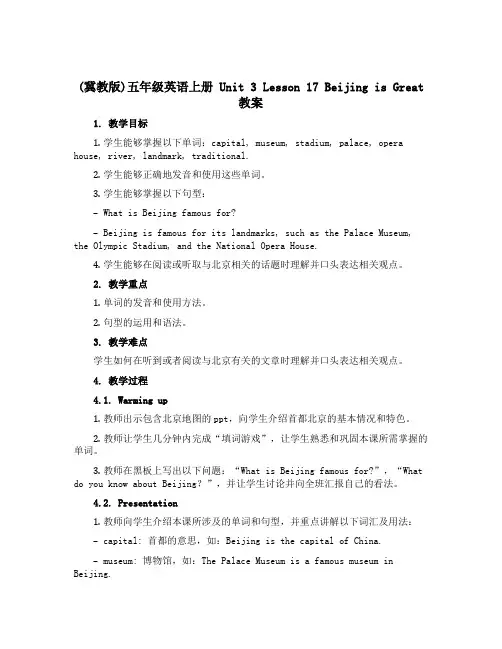
(冀教版)五年级英语上册 Unit 3 Lesson 17 Beijing is Great教案1. 教学目标1.学生能够掌握以下单词:capital, museum, stadium, palace, opera house, river, landmark, traditional.2.学生能够正确地发音和使用这些单词。
3.学生能够掌握以下句型:–What is Beijing famous for?–Beijing is famous for its landmarks, such as the Palace Museum, the Olympic Stadium, and the National Opera House.4.学生能够在阅读或听取与北京相关的话题时理解并口头表达相关观点。
2. 教学重点1.单词的发音和使用方法。
2.句型的运用和语法。
3. 教学难点学生如何在听到或者阅读与北京有关的文章时理解并口头表达相关观点。
4. 教学过程4.1. Warming up1.教师出示包含北京地图的ppt,向学生介绍首都北京的基本情况和特色。
2.教师让学生几分钟内完成“填词游戏”,让学生熟悉和巩固本课所需掌握的单词。
3.教师在黑板上写出以下问题:“What is Beijing famous for?”,“What do you know about Beijing?”,并让学生讨论并向全班汇报自己的看法。
4.2. Presentation1.教师向学生介绍本课所涉及的单词和句型,并重点讲解以下词汇及用法:–capital: 首都的意思,如:Beijing is the capital of China.–museum: 博物馆,如:The Palace Museum is a famous museum in Beijing.–stadium: 运动场,如:The Olympic Stadium is a famous stadium in Beijing.–palace: 宫殿,如:The Palace Museum is a famous palace in Beijing.–opera house: 歌剧院,如:The National Opera House is a famous opera house in Beijing.–river: 河流,如:The Yangtze River is a famous river in China.–landmark: 地标,如:The Olympic Stadium is a landmark building in Beijing.–traditional: 传统的,如:Beijing has a lot of traditional food and culture.2.教师让学生看一段有关北京的文章,并集体讨论问题:“What is Beijing famous for?”,然后让学生回答针对此问题的相关句子。
